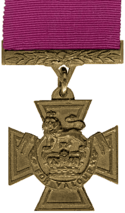James Kenny (VC) facts for kids
Quick facts for kids
James Kenny
|
|
|---|---|
 |
|
| Born | 1824 Dublin, Ireland |
| Died | 2 October 1862 (aged 37–38) Mooltan, British India |
| Buried |
Mooltan Cemetery
|
| Allegiance | |
| Service/ |
|
| Years of service | † 1862 |
| Rank | Private |
| Unit | 53rd Regiment of Foot |
| Battles/wars | Indian Mutiny |
| Awards | Victoria Cross |
James Kenny was a brave soldier from Ireland. He lived in the 1800s. He is known for receiving the Victoria Cross. This is the highest award for bravery. It is given to soldiers from the United Kingdom and Commonwealth countries. It honors incredible courage when facing the enemy.
Who Was James Kenny?
James Kenny was born in Dublin, Ireland, in 1824. He joined the British Army. He became a Private in the 53rd Regiment of Foot. This regiment later became known as the King's Shropshire Light Infantry.
His Amazing Bravery
James Kenny showed great bravery during the Indian Mutiny. This was a big conflict in British India in 1857. He was about 33 years old at the time.
His brave act happened on November 16, 1857. This was during the attack on a place called the Secundra Bagh. This attack was part of the Relief of Lucknow. During the battle, James Kenny volunteered for a very dangerous job. He offered to bring ammunition to his company. He had to do this while under heavy enemy fire. The bullets were coming from many directions. This act of courage was very important. It helped his fellow soldiers keep fighting.
Because of his bravery, his fellow soldiers chose him for the Victoria Cross. This was a special way to pick someone for the award.
What is the Victoria Cross?
The Victoria Cross is the highest military award. It is given for extreme bravery. It was created by Queen Victoria in 1856. The medal is made from the bronze of a captured Russian cannon. This cannon was taken during the Crimean War. It is a very rare and respected award.
His Final Years
After his brave actions, James Kenny continued his service. Sadly, he was killed in action. This happened on October 2, 1862. He died in Mooltan, which was then part of British India. He was buried in the Mooltan Cemetery.
 | Frances Mary Albrier |
 | Whitney Young |
 | Muhammad Ali |

